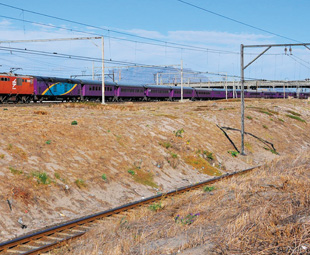Of Rhodes and rails!

Last month I made some suggestions for the Gautrain. A further development has been the withdrawal, due to lacking support, of the Nasrec Business Express (launched with much fanfare in October 2014). Taking into account current issues – such as the toppling of Rhodes’ statue, xenophobia and colonialism – we need to take a broader look at the current role of railways throughout Africa.
My grandmother was an unwilling guest of King Edward VII in the concentration camp at Kroonstad during the winter of 1901. While she would heartily approve of throwing poo at a statue of Rhodes, Africa today is hurting in part because of the lack of transport vision of its leaders – of both the imported and home-grown varieties.
If Rhodes had lived for at least another twenty years, Africa would have been covered by a more extensive network of railways than we have today. We will never know by exactly how much, or whether the rot and decay, which has decimated many African railways since then, would have taken place anyway.
It’s nice to daydream about being able to travel by rail all the way from Lesotho to Liberia and from Senegal to Swaziland. (I’m trying to avoid the colonial Cape to Cairo cliché here.) It is fair to speculate that fewer people would be drowning in the Mediterranean and fewer people would be having their shops looted in South Africa, if African countries joined up their transport networks – both road and rail.
For about 100 years, South Africa had what was, arguably, the best narrow-gauge track railway system in the world. Perhaps this is still the case, but much of the shine has been taken off in recent years – our own lack of vision has resulted in an underperforming rail system, both on the freight and (even more important) the passenger side.
South Africa still suffers from delusions of grandeur, however. On April 23, a spokesman for Transnet pompously admonished the editor of Business Day for quoting “analysts who display no significant knowledge about Transnet”. Apparently, if analysts want the approval of Transnet, they need to be familiar with a document called the Market Development Strategy.
I have to confess that I had never heard of it, but, helpfully, the spokesman provided the uninformed among us with a list of bullet points, which include: reducing the cost of doing business, enabling economic growth, preparing for mineral beneficiation (MB), enabling a shift from mining to a networked economy, and providing capacity against long-term investment returns.
Not only do these points have a strong sniff of “cut and paste” about them, but two of them – MB and a shift from mining – worry me. Neither will help the rail system much, given its present philosophy. If MB leads to the production of higher-value goods, they are less likely to go by rail.
A shift from mining will also hurt the railway, which at the moment actually puts up quite an impressive performance in helping to export our raw materials with cutting-edge efficiency. In the process it makes a profit of over R3 billion a year, which, presumably, helps to keep investors and the rating agencies happy.
Sadly, the R3 billion is probably more than wiped out by the failure of the railway to make a dent in the ever-growing amount of road traffic – both freight and passenger – that is strangling parts of South Africa’s road network.
Starting with urban passengers; way back in 1982 the railway carried out over 700-million commuter trips. By now we should be over the one billion mark, but things have actually slipped badly in the last 30 years.
The formula for reaching a billion is the same for all public transport in South Africa. Among other things, we need to set up a Transport Authority, integrate road and rail services, charge the same fare on road and rail and operate common timetables.
New coaches alone won’t do it. For rural areas, and freight in general, the railway needs to run a guaranteed (scheduled) daily train service on every active line in the country, plus on quite a few inactive lines that have been allowed to fall into disuse.
The daily trains should also have passenger coaches at the back. We will be surprised how many people will use them. This will be the platform for raising the profile of the railway throughout the country.
The accountants might not be happy, but Transnet (which, for some reason that totally eludes me, trains chartered accountants), should put together a short course for them to think outside the box.
Transnet and the Passenger Rail Agency of South Africa (Prasa) should be taking young South Africans (many of whom have never seen a station or shunting yard) on guided tours and giving learners free rail transport at weekends to show them what travelling by train is all about.
After more than 150 years of serving mainly mining interests, the time has come for our railway to cater for the entire community. It’s the post-colonial thing to do.
Vaughan Mostert developed a love for public transport early in life, which led to a lifelong academic interest in the subject. He recently retired as a senior lecturer from the Department of Transport and Supply Chain Management at the University of Johannesburg. Through Hopping Off, Mostert leaves readers with some parting food for thought as he continues his push for change in the local public transport industry.
Published by
Focus on Transport
focusmagsa




